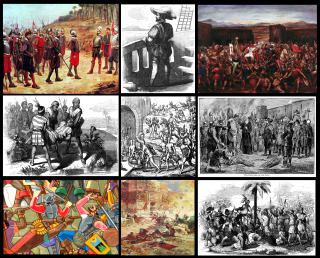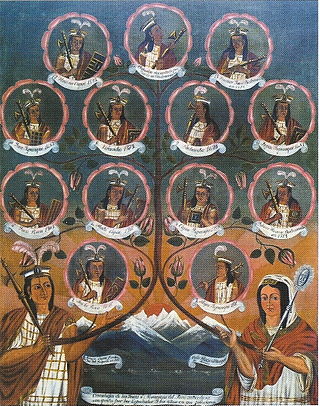
Tupaq Amaru or Thupa Amaru was the last Sapa Inca of the Neo-Inca State, the final remaining independent part of the Inca Empire. He was executed by the Spanish following a months-long pursuit after the fall of the Neo-Inca State.

The Viceroyalty of Peru, officially known as the Kingdom of Peru, was a Spanish imperial provincial administrative district, created in 1542, that originally contained modern-day Peru and most of the Spanish Empire in South America, governed from the capital of Lima. Along with the Viceroyalty of New Spain, Peru was one of two Spanish viceroyalties in the Americas from the sixteenth to the eighteenth centuries.

Vilcabamba or Willkapampa, often called the Lost City of the Incas, is a lost city in the Echarate District of La Convención Province in the Cuzco Region of Peru. Vilcabamba means "sacred plain" in Quechua. The modern name for the Inca ruins of Vilcabamba is Espíritu Pampa.

The Spanish conquest of the Inca Empire, also known as the Conquest of Peru, was one of the most important campaigns in the Spanish colonization of the Americas. After years of preliminary exploration and military skirmishes, 168 Spanish soldiers under conquistador Francisco Pizarro, along with his brothers in arms and their indigenous allies, captured the Sapa Inca Atahualpa in the 1532 Battle of Cajamarca. It was the first step in a long campaign that took decades of fighting but ended in Spanish victory in 1572 and colonization of the region as the Viceroyalty of Peru. The conquest of the Inca Empire, led to spin-off campaigns into present-day Chile and Colombia, as well as expeditions to the Amazon Basin and surrounding rainforest.
"The Last Article" (1988), is an alternate history short story by Harry Turtledove.

Vitcos was a residence of Inca nobles and a ceremonial center of the Neo-Inca State (1537–1572). The archaeological site of ancient Vitcos, called Rosaspata, is in the Vilcabamba District of La Convención Province, Cusco Region in Peru. The ruins are on a ridge overlooking the junction of two small rivers and the village of Pucyura. The Incas had occupied Vilcabamba, the region in which Vitcos is located, about 1450 CE, establishing major centers at Machu Picchu, Choquequirao, Vitcos, and Vilcabamba. Vitcos was often the residence of the rulers of the Neo-Inca state until the Spanish conquest of this last stronghold of the Incas in 1572.
Darkness, also known as World at War, is a series of six fantasy novels by Harry Turtledove.

The Incas were most notable for establishing the Inca Empire which was centered in modern-day South America in Peru and Chile. It was about 4,000 kilometres (2,500 mi) from the northern to southern tip. The Inca Empire lasted from 1438 to 1533. It was the largest Empire in America throughout the Pre-Columbian era. The Inca state was known as the Kingdom of Cuzco before 1438. Over the course of the Inca Empire, the Inca used conquest and peaceful assimilation to incorporate the territory of modern-day Peru, followed by a large portion of western South America, into their empire, centered on the Andean mountain range. However, shortly after the Inca Civil War, the last Sapa Inca (emperor) of the Inca Empire was captured and killed on the orders of the conquistador Francisco Pizarro, marking the beginning of Spanish rule. The remnants of the empire retreated to the remote jungles of Vilcabamba and established the small Neo-Inca State, which was conquered by the Spanish in 1572.

Francisco Álvarez de Toledo, also known as The Viceroyal Solon, was an aristocrat and soldier of the Kingdom of Spain and the fifth Viceroy of Peru. Often regarded as the "best of Peru's viceroys", he is as often denounced for the negative impact his administration had on the Indigenous peoples of Peru.

A rump state is the remnant of a once much larger state, left with a greatly reduced territory in the wake of secession, annexation, occupation, decolonization, or a successful coup d'état or revolution on part of its former territory. In the last case, a government stops short of going into exile because it controls part of its former territory.
The Battle of Ollantaytambo took place in January 1537, between the forces of Inca emperor Manco Inca and a Spanish expedition led by Hernando Pizarro during the Spanish conquest of Peru. A former ally of the Spaniards, Manco Inca rebelled in May 1536, and besieged a Spanish garrison in the city of Cusco. To end the stand-off, the besieged mounted a raid against the emperor's headquarters in the town of Ollantaytambo. The expedition, commanded by Hernando Pizarro, included 100 Spaniards and some 30,000 Indian auxiliaries against an Inca army more than 30,000 strong.

A Different Flesh is a collection of alternate history short stories by American writer Harry Turtledove. The stories are set in a world in which Homo erectus, along with various megafauna, survived to the modern times in the Americas as the Native Americans along with any other human cultures.

Counting Up, Counting Down is a collection of short stories by Harry Turtledove, most of which were first published in various fiction magazines in the 1990s. It is named after two of the stories appearing in the book, one called "Forty, Counting Down" and the other named "Twenty-One, Counting Up", which are united by the character of Justin Kloster. The story genres represented include alternate history, time travel, fantasy, straight historical fiction, and more. Two stories, "The Decoy Duck" and "The Seventh Chapter," are set in the Videssos Universe, with the former story being set before any of the other stories and books in that universe. The book was originally published by Del Rey as a trade paperback in January 2002. In the same month, it was brought out as a leatherbound limited edition by Easton Press.
"Uncle Alf" (2002) is an alternate history short story by Harry Turtledove. It was first published in Turtledove's edited anthology Alternate Generals II in 2002 and was later reprinted in his short story collection Atlantis and Other Places in 2010.
Atlantis is an alternate history series written by Harry Turtledove. The point of divergence occurs around 85 million years ago when the eastern portion of the North American continent splits off from the rest of the continent and forms Atlantis, a separate continent farther east in the Atlantic Ocean.

The Best of Harry Turtledove is a collection of science fiction short stories by American author Harry Turtledove. It was first published in hardcover and ebook by Subterranean Press in April 2021.
Bibliography of science fiction, fantasy, historical fiction and nonfiction writer Harry Turtledove:










